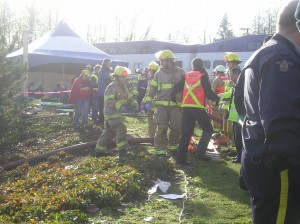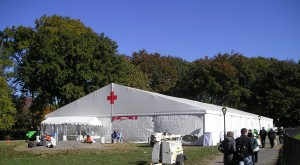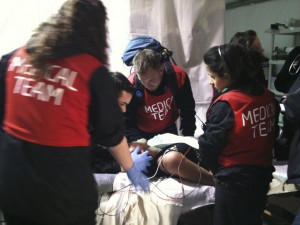
TransGuard 1 Disaster Exercise
Members of the MGMIG have been participating in or coordinating medical care at mass gatherings for over twenty years. During our experience we noticed that planning for an event and planning a response to a natural or man-made disaster shares common skills and knowledge.
Some common similarities include:
- Location – usually temporary structures such as tents located in fields, stadiums, or along the side for the road
- Environment – at the mercy of the season (extreme heat or cold during the summer and winter months, severe storms with flooding, thunder, lightening, and heavy rain)
- Equipment – limited to storage space, planning required how/where to deploy, access/egress from the site, handling expirables
- Communication – 2-way radios have a limited range, require recharging, cell phone communication may be down due to increased cell tower use or damaged/destroyed cell towers, training team members on radio protocol, signing in/out equipment, land lines for phone and fax
 Multiagency Responses – Coordinating all the above as other agencies join the event or disaster response (ambulance service, paid/volunteer medical organizations, fire department, security, police, transit etc…). Each agency has their own operating policies and procedures which may not always mesh seamlessly with others
Multiagency Responses – Coordinating all the above as other agencies join the event or disaster response (ambulance service, paid/volunteer medical organizations, fire department, security, police, transit etc…). Each agency has their own operating policies and procedures which may not always mesh seamlessly with others- Staff – multidisciplinary teams with varying experience working in a new environment out of unfamiliar equipment
- Budget – often limited requiring efficiency and documentation of use
 Our MGMIG is working to expand our Learner Elective to include a theoretical disaster component through distance education. To acquire clinical and planning skills, Learners will be invited to participate in the planning of events as well as providing medical care to participants and spectators. We feel that offering this program will be a great way to train large numbers of healthcare providers at a low cost. During events, especially marathons, long distance cycling events, and multi-day festivals, hundreds of patients are seen over short periods of time. Another great reason to offer disaster medicine training at mass gathering events is that they are tonnes of fun.
Our MGMIG is working to expand our Learner Elective to include a theoretical disaster component through distance education. To acquire clinical and planning skills, Learners will be invited to participate in the planning of events as well as providing medical care to participants and spectators. We feel that offering this program will be a great way to train large numbers of healthcare providers at a low cost. During events, especially marathons, long distance cycling events, and multi-day festivals, hundreds of patients are seen over short periods of time. Another great reason to offer disaster medicine training at mass gathering events is that they are tonnes of fun.